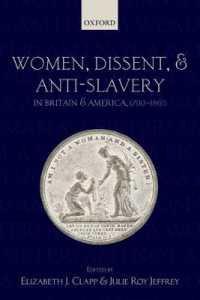- ホーム
- > 洋書
- > 英文書
- > Philosophy
Full Description
Steven Nadler presents a biographical and philosophical study of Louis de La Forge (1632-1666), a medical doctor who was an extremely important, but for a long time relatively neglected, follower of Descartes in the seventeenth century. His sophisticated contributions to the metaphysics, philosophy of mind, and physiology of Cartesianism in the decades after Descartes' death in 1650 were instrumental in making that philosophy the dominant philosophical paradigm of the period; it would be supplanted by Newtonianism only in the eighteenth century.
La Forge began his Cartesian career by providing wood-cut illustrations and an extensive commentary for the 1664 edition of Descartes' Traité de l'homme, the first original-language publication of part of the larger, groundbreaking treatise Le Monde that was left unpublished in Descartes' lifetime. In his commentary, La Forge is a devoted and faithful but not uncritical disciple who defends, supplements, updates and even corrects Descartes' account of the human body, which treats it as a "machine" that operates on the principles of the mechanical philosophy. In 1666, La Forge published his own Traité de l'esprit de l'homme, a treatise on the human mind. Explaining the mind and its union with the body was something that Descartes had long planned to do but never really carried out in a systematic manner. La Forge's most innovative and influential philosophical contribution in the Traité--one which goes beyond anything Descartes envisioned--is his limited version of the doctrine of occasionalism, which accords God an active and ongoing causal role in the world and reduces natural substances to being "occasions" for God's efficacious activity. La Forge thereby set the stage for later, even more unorthodox developments in Cartesianism.
Contents
List of Figures
Introduction
1. Louis de La Forge
2. Cartesianism, 1650-1663
3. Illustrating the World
4. A Disciple's Commentary
5. The Cartesian Mind
6. The Union of Mind and Body
7. Occasionalisms
8. The World of Bodies
9. Mind and Motion
10. Ideas and Volitions
Conclusion
Notes
Bibliography
Index








